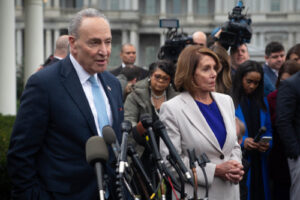The Taxation Debate: Are You Really in Control of Your Money?
At Extreme Investor Network, we strive to provide you with in-depth analyses and insights that challenge conventional wisdom and inform you about critical economic issues impacting our lives. Today, we turn our attention to a contentious perspective brought to light by a rather revealing comment from Senate Minority Leader Chuck Schumer. In a national television appearance, Schumer articulated the pervasive mindset among some politicians—that your hard-earned money essentially belongs to the government.
The Government’s Perception of Wealth
Schumer’s comments were not just revealing; they were emblematic of a broader attitude among career politicians. He mockingly framed the mindset of entrepreneurs and business owners who question rising taxes, stating, "I made my money all by myself. How dare your government take my money from me?" With an estimated net worth of $81 million himself, Schumer seems to overlook the deep-seated frustration that many Americans feel towards a system where taxes are seen as a government’s entitlement to wealth generated by individuals.
This sentiment is further exacerbated by rising taxes and large-scale spending on programs that many citizens didn’t consent to fund. People often feel as though their contributions to the economy and their sacrifices are met with disdain rather than appreciation, leading to a growing belief that government is a burden, rather than a partner, in their lives.
The Flawed Logic of Excessive Taxation
This struggle is not merely philosophical; it’s rooted in the operational mechanics of government. Many citizens are increasingly frustrated that their tax dollars appear to fund initiatives they did not vote for. For instance, recent allocations for foreign aid, including healthcare initiatives in overseas countries, raise questions about government priorities.
When we reflect on Schumer’s thoughts, we realize that there is a perception among some politicians that citizens are incapable of managing their finances without government intervention. This paternalistic view diminishes individual agency and perpetuates a cycle of dependence on the very institutions that claim to serve the public. It begs the question: Whose money is it, really?
The Consequences of Taxation Without Representation
At Extreme Investor Network, we believe in a fundamental principle enshrined in the Constitution: no taxation without representation. However, the reality is that many government expenditures are never subjected to a popular vote, resulting in feelings of disenfranchisement among taxpayers. The explosion of national debt is not just an economic problem; it represents a broader societal risk. As the government imposes more taxes, citizens often find themselves squeezed tighter, struggling to balance their commitments to family, business, and savings.
Moreover, government spending patterns reflect a shift toward a more centralized approach to control, often justified under the guise of social responsibility. With the advent of measures like the Common Reporting Standard (CRS), established by the OECD, we see governments worldwide entrenching their reach into citizens’ financial affairs. This global trend signals a move toward a future where taxation becomes inevitable, and economic freedom becomes increasingly restricted.
What Lies Ahead: The Path Towards Economic Dependency
The trajectory we observe today raises critical questions about the future of our economic systems. Increasingly, globalist philosophies are motivating governments to establish a framework where dependency on state provisions becomes the norm. Concepts such as Central Bank Digital Currencies (CBDCs) hint at a future where personal finance is entirely monitored and regulated.
A cashless society, with immediate tracking and taxation mechanisms, brings us closer to a framework of economic surveillance rather than freedom—paving the way for policies that demand 35% more from working citizens. The notion that "you will own nothing and be happy" reverberates through these financial innovations, emphasizing a shift in power dynamics that could redefine personal ownership in unprecedented ways.
A Call to Awareness
As we navigate these turbulent waters, it’s crucial to remain vigilant and informed. Understanding the implications of government actions and their impact on our financial autonomy is vital for individuals aiming to create wealth and secure their future. By staying engaged in these discussions and advocating for transparent governance, we can work toward a system that honors the contributions of all citizens rather than perceives them as mere sources of revenue.
At Extreme Investor Network, we’re dedicated to unpacking these critical issues and encouraging an informed dialogue. Keep following us for more insights that empower you to navigate the economic landscape effectively. Your financial future depends on it!

